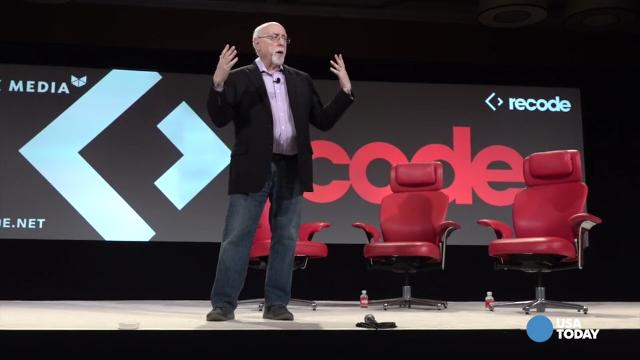Bezos, Gates, Pichai abuzz over AI, while Musk worries

RANCHO PALOS VERDES, Calif. — Remember when the smartphone was the “it” device? It wasn’t that long ago.
But now, at least according to the chatter at the Code conference here, it’s all about AI, or artificial intelligence. Now and over the next few years.
Speaker after speaker here got absolutely giddy talking about software programs that can learn from our behavior, anticipate our next moves, and do things we used to have to endure.
Long-time geek Bill Gates, the co-founder of Microsoft called the emergence of AI the realization of all those dreams young science fans had as kids. “This is what it was all leading up to. Machines that are as capable and more capable than human intelligence.”
Gates’ Seattle neighbor, Amazon founder Jeff Bezos, was just as effusive.
“It’s hard to overstate how big of an impact this will have on society over the next 20 years,” Bezos said. “It is big.”
That's the pro side. Elon Musk, the charismatic CEO of both Tesla Motors, which makes cutting edge electric cars, and SpaceX, which makes rockets and spacecraft to explore new planets, is worried about where it's all leading.
"I am concerned about certain directions that AI could take that would be not good for the future," Musk said. "Not all AI futures are benign. If we create some super intelligence that exceeds us by a lot, it’s very important that it be benign.
His worry: that AI get "concentrated in the hands of a few." Asked to clarify at Code whether he was talking about the computer or the person running the computer, he said: “I won’t the name, but there is only one.”
The concept that a machine could be a better driver than us has been explored by Google for several years with its self-driving cars, and it's a poster child for artificial intelligence.
Clearly taking a swipe at Google, he was asked again--was he referring to the company that has been pushing AI for self-driving cars? Musk repeated: "There is only one.”
Beyond self-driving cars, Google and rival Facebook use AI to identify faces in photos. Google is using it to recognize spoken queries, while Facebook is using AI in the Messenger app for business communication, to speed up the ordering process for products like flowers and clothing.
And of course, there's Siri, the personal digital assistant from Apple that can answer queries, place phone calls and play music selections.
Sometimes. When she gets it right.
Amazon's Echo is another version of the AI experience. The always-on speaker responds to requests for controlling the connected home, reads the weather and news and accesses songs from your music library by announcing the "wake" word Alexa.
However, she often responds with “I don’t understand your question.”
AI may be the cool new thing, but it has a long ways to go.
“I love playing with Alexa, even though she’s wrong 70% of the time,” said Aaron Hirschhorn, co-founder of the DogVacay hail-a-dog-sitter app, who attended the conference.
The success of Alexa — it’s a runaway hit for Amazon — brought AI more openly into the public discussion.
Google has its take on Echo coming later this year, Google Home, a speaker that can answer questions, turn on and off devices in the connected home, play music and speak conversationally with you. Apple reportedly has a Siri-enabled home speaker in the works as well.
At Code, Google CEO Sundar Pichai was asked how he could top Amazon and his reply was, by being Google. The goal is to use AI to hear your query, anticipate the next one, and keep a rolling conversation going.
"A true dialogue," is the goal, he said, adding that Google has a lot of work to do to get there over the next 5-10 years.
There were search engines before Google, mapping and e-mail as well, but Google put its twist on all of them. Same goes for AI. "We take the long view and bring your strengths to it. This is the heart of what we do."
The future may turn out great, or spooky, if Elon Musk's fears come to pass.
But as Hirschhorn points out, AI won’t help him take care of dogs. "It won’t work for anything where real physical world needs to be done. Cleaning, moving...people still need to interact with each other and it won’t change that any time soon.”
Follow Paste BN tech columnist and #TalkingTech host Jefferson Graham on Twitter, @jeffersongraham.